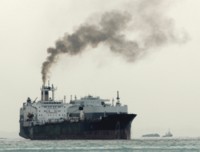Emissions from shipping to be regulated
 Market-based measures to reduce greenhouse gas emissions from international shipping will be among the key items on the agenda of the Marine Environment Protection Committee of the International Maritime Organization (IMO), when it meets for its 63rd session from 27 February to 2 March 2012, at IMO
Market-based measures to reduce greenhouse gas emissions from international shipping will be among the key items on the agenda of the Marine Environment Protection Committee of the International Maritime Organization (IMO), when it meets for its 63rd session from 27 February to 2 March 2012, at IMO The MEPC will continue to consider a number of proposals for market-based measures to assist the reduction of greenhouse gas emissions from international shipping.
This follows the adoption, in July 2011, of amendments to MARPOL Annex VI Regulations for the prevention of air pollution from ships, to add a new chapter 4 to Annex VI on Regulations on energy efficiency for ships to make mandatory the Energy Efficiency Design Index (EEDI), for new ships, and the Ship Energy Efficiency Management Plan (SEEMP) for all ships.
Emissions from shipping are considered a significant source of air pollution, responsible for 18 to 30 percent of all nitrogen oxide and 9 percent of sulphur oxide pollution. A 2009 study estimated that in one year, a single large container ship can emit cancer and asthma-causing pollutants equivalent to that of 50 million cars.
The Committee will consider the report of an intersessional meeting of the Working Group on GHG Emissions from Ships, which met in March 2011 to consider suitable market-based measures to reduce GHG emissions from international shipping.
This follows the submission of a comprehensive report by an Expert Group, which had carried out a feasibility study and impact assessment of several possible market-based measures submitted by Governments and observer organizations.
The intersessional group held an extensive exchange of views on issues related to, among other things, the desirability of market-based measures providing: certainty in emission reductions or carbon price; revenues for mitigation, adaptation and capacity-building activities in developing countries; incentives for technical and operational improvements in shipping; and offsetting opportunities.
The proposals under review range from a contribution or levy on all CO2 emissions from international shipping or only from those ships not meeting the EEDI requirement, via emission trading systems, to schemes based on a ship’s actual efficiency, both by design (EEDI) and operation (SEEMP).
The Committee will consider three sets of draft guidelines intended to assist in the implementation of the Regulations on Energy Efficiency for Ships in MARPOL Annex VI.
The draft guidelines were developed by the intersessional meeting of the Working Group on Energy Efficiency Measures for Ships, which met in January 2012. Work on developing EEDI frameworks for those ships that are not covered by the current EEDI formula will also be progressed.
The Committee is expected to outline future work on this matter, including further in-depth examination of the impact of market-based measures on world trade and sustainable development and possible impacts on developing countries as well as their consumers and industries.
The Committee will also continue its consideration of matters relating to the availability of fuel oil to meet the requirements set out in MARPOL Annex VI.
You can return to the main Market News page, or press the Back button on your browser.

